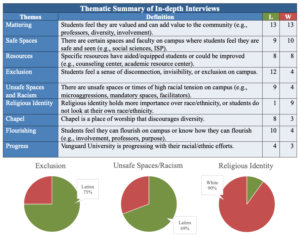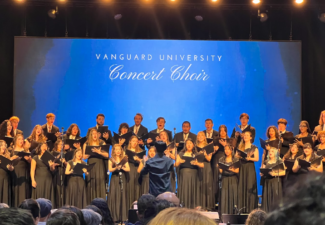Hosting a 45% Hispanic student population, Vanguard University serves as one of Orange County’s three Hispanic Serving Institutions (HSIs). With this title comes the responsibility to support and empower Hispanic students, a commitment that the university is making strides to improve upon.
Using data from the 2022 Campus Climate Assessment, senior Priscilla Ngantung, under professor of anthropology and sociology Dr. Isaac Voss, analyzed the Latine (referred to as Latinx in the study) and white student experiences on campus in order to gain a better understanding of how to make students feel like they matter. The findings of her research, including personal testimonies from students on campus, lead to a series of recommendations on inclusivity and resources to help students flourish. These were presented to the Office of Student Affairs, the Diversity, Equity, and Inclusion team, and the presidential cabinet, and will be presented at the WASC Accreditation Resource Conference.

Thematic Summary of In-depth Interviews.
Firstly, it was found in the Campus Climate Assessment that 42.2% of students want more safe-spaces for multi-cultural dialogue. One student stated, “ISP events and … I love my, like, Sociology class a lot … places like that, I feel most comfortable [discussing race/ethnicity].”
Another common theme among student’s concerns for diversity was chapel. As a cornerstone of campus culture, it is imperative for chapel to make all groups feel seen and welcome.
From the student interviews, over 75% percent of students that felt excluded on campus were Hispanic. Having Spanish worship offered a space for those students to connect with the community and their faith, but it received some backlash, with one Latine student recalling, “The Spanish worship team, they were like, leading worship, and it was beautiful. And I remember … these two guys in front of me just being like, irritated that they couldn’t understand what they were saying … And then even like making fun of some of them … in chapel like, John Mark addressed it and was trying to say like, ‘We should be thanking them for sharing this part of their culture with us … it felt like a weird tension was growing within the chapel … [it is] not the safest to talk about culture.”
Other students expressed desire to participate, but felt like they did not have the space to do so, with one white student stating, “Because I will never experience what other people do … when those conversations come up, like, I have nothing to contribute, or I shouldn’t contribute because I’m white … Vanguard is probably the most diverse school I’ve went to.”
To better serve the Hispanic and non-Hispanic populations at Vanguard, Ngantung’s recommendation is to continue celebrating Spanish chapels and make them accessible to non-Spanish speakers with tools such as translated subtitles.
The next recommendation is to hire more staff of Latin descent. One Latine student stated, “I felt like … some students that were of color … weren’t getting the help that they were seeking for as other students that were white … a lot of the staff are, like, mainly white.”
Lastly, there is a need to increase resources for Latine students and their families, including services such as translations. One Latine student shared their experience with coming to Vanguard and being unable to share it with their family.
“The Lions care package that goes home—asking parents if they want to send their students something, that was sent home [in English], so that was a loss of parents who don’t speak English or read in English. So, I feel like, if they were to send stuff like that home, they should include at least Spanish … anything that’s sent home … information could also be said in Spanish too,” stated the student.
By offering campus updates and promotional materials in Spanish as well as English, students and their families can feel more connected to the community.
Despite the challenges placed upon Hispanic students, there is a sense of hopeful optimism as Vanguard works towards creating a more inclusive environment. From the student interviews, almost 75% of students that felt that they could flourish on campus were Hispanic.
There is always room to grow, and listening to the voices of real students is a significant step in improving campus culture for all. The campus climate assessment and it’s ensuing recommendations truly demonstrate that your story matters.

 The Liturgical Calendar: Should Christians Observe It?
The Liturgical Calendar: Should Christians Observe It? Embracing Authenticity in the Pursuit of Success: A Reflection on Journalism, Education, and Meaningful Academia
Embracing Authenticity in the Pursuit of Success: A Reflection on Journalism, Education, and Meaningful Academia Spring Concert: Music From Around the World
Spring Concert: Music From Around the World Recycling on College Campuses
Recycling on College Campuses
Leave a Reply